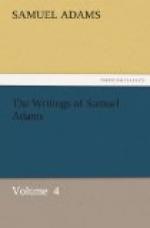they looked no further. They did not imagine,
that he who had been the instrument of recovering
the independence of their country, could be the very
man who was to effect the ruin of their liberties.
By the Constitution of Sweden their kings were elective,
and the powers of the crown were exceedingly limited.
The unsuspecting people even voluntarily gave up their
right of election, and suffered Gustavus to enlarge
the powers of the crown, and entail it in his own family!
This is the account which the history of Sweden has
given us; and it affords an instance among a thousand
others, of the folly and danger of trusting even good
men with power, without regarding the use they make
of it. Power is in its nature incroaching; and
such is the human make, that men who are vested with
a share of it, are generally inclined to take more
than it was intended they should have. The love
of power, like the love of money, increases with the
possession of it; and we know, in what ruin these
baneful passions have involved human societies in
all ages, when they have been let loose and suffered
to rage uncontrouled— There is no restraint
like the pervading eye of the virtuous citizens.—I
hope therefore our countrymen will constantly exercise
that right which the meanest of them is intitled to,
and which is particularly secured to them by our happy
constitution, of inquiring freely, but decently, into
the conduct of the public servants. The very
being of the Commonwealth may depend upon it.
I will venture to appeal to the experience of ancient
Republicks, to evince the necessity of it; and it
is never more necessary than in the infancy of a Commonwealth,
and when the people have chosen honest men to conduct
their affairs. For, whatever is done at a time
nearly contemporary with the constitution, will be
construed as the best exposition of it; and a mistaken
principle of a virtuous ruler, whose public conduct
is generally good, and always supposed to be honestly
intended, carries with it an authority scarcely to
be resisted, and precedents are thus formed which
may prove dangerous—perhaps fatal.”—
1 Endorsed by Adams: “The foregoing was
sent to Mr Edes by the Post Mar 27, 81.”
TO SAMUEL COOPER.
[Ms., Samuel Adams Papers, Lenox Library.]
Philade Apr 23 1781
MY DEAR SIR
I did not receive your favor of the 3d Instt till
yesterday; a week later than Letters of the same Date
from some others of my Boston friends were brought
to me by the Post. As the Subject is delicate,
I do not chuse to continue it in this Letter, which
is to go thro a Channel provd from repeated Experience
to be uncertain & unsafe. It was for this Reason
that I committed to the Care of a private friend, my
Letter to Mrs A of the 1st of Feby which she communicated
to you. I am glad she did it in a Manner so acceptable.
Indeed I never found Reason to doubt her Discretion.
What you have written is very obliging & satisfactory
to me. I hope to have the Pleasure of seeing you
next Month. We will then, after our usual Manner,
disclose each others Hearts.




